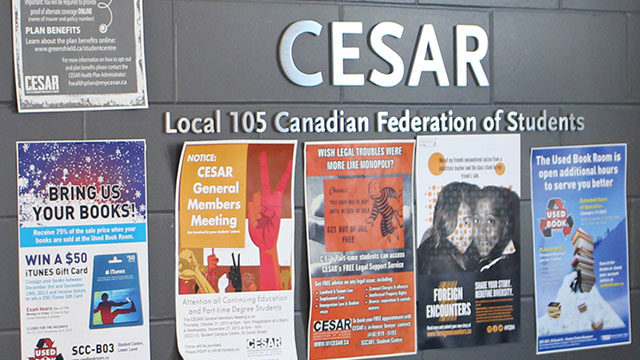A number of Ryerson senators expressed concern over the situation at a Jan. 28 senate meeting, according to CESAR’s president

Two hours after Ryerson University announced it was terminating its operating agreement with the Ryerson Students’ Union, the RSU’s student issues and advocacy co-ordinator was barred from representing a student at a penalty meeting.
This was a “huge red flag” to Nicole Brayiannis, the president of the Continuing Education Students’ Association of Ryerson (CESAR), which represents 16,000 continuing education and part-time education students, as well as undergraduate students enrolled in Chang School courses.
Brayiannis spoke about the situation at a Jan. 28 senate meeting, where she said a number of other senators expressed concerns.
“It is hypocritical of the university to critique the Ryerson Students’ Union of mismanagement when there has been such a breach of fair process in very real terms to students seeking fair appeals,” Brayiannis said in a letter that was posted to Facebook and read aloud at the meeting.
Ryerson senate’s academic integrity policies state that students involved in any stage of a formal academic misconduct or grade appeals process may consult and be represented by an advocate from the RSU or CESAR.
In a statement to the Ryersonian, Ryerson president Mohamed Lachemi said students requiring academic advocacy support have been advised they can reschedule for a later date or bring a “support person” to their hearing.
He said five students have been affected to date: four rescheduled, and one proceeded with the hearing.
Lachemi said Ryerson shares the concerns expressed by CESAR and the RSU. He said the university has offered to add resources to CESAR “to address the burden they’ve identified” and expects to hear back from them on this soon.
The university is also “actively working on a number of options to help students who feel they need academic advocacy” and hopes to have an update in the coming days.
RSU president Vanessa Henry and the union’s student issues and advocacy co-ordinator, José González, have not responded to requests for comment.
The online booking form for RSU advocacy services shows no available slots.
Since Ryerson terminated its agreement with the RSU on Jan. 24, Lyndall Musselman, CESAR’s student rights co-ordinator, said she has received several requests from undergraduate students — and in some cases, parents — looking for representation.
She said students are concerned because they see that based on senate policies, and in notices of suspicion of academic misconduct, they have a right to an advocate.
Musselman said while she will try to meet with students to figure out their situation, if they’re an RSU member, she won’t attend meetings or officially represent the student.
“I hate to turn away students in need, but I have to prioritize CESAR members [because] that’s who we represent,” she said.
She also said university administrators have been reaching out to her trying to move ahead with undergraduate appeals.
“I’m sure those cases are getting delayed, which is an unfortunate thing, because there’s supposed to be a timely process in order for fair proceedings.”
Musselman said González is allowed to sit in on the meetings, but can’t speak on behalf of the student like he usually could.
“It’s an intimidating and daunting process and often students sort of blank out, get overwhelmed with emotions — they’re human,” she said. “So we’re there to help them find the words and to speak on their behalf.”
This time of year is especially busy. The deadline for grade appeals was Jan. 20. That means now is around the time when students are receiving decision letters from the first level of appeals and potentially looking for support for the next stage. Now is also when students might be submitting first assignments or essays and may be called into investigation meetings.
“When it comes to things like student advocates, [the RSU is] a leading framework, and they’re a leading example for other universities to model after,” Brayiannis said.
She said the decision was concerning for students’ autonomy, and for their right to have support and advocacy in university settings.
CESAR is calling for the RSU and Ryerson to go back to the negotiating table, but Brayiannis notes there are other options, such as using a third-party mediator. She said CESAR received no prior notice of the university’s decision and received notice 30 minutes after Ryerson’s statement was posted online.
Musselman said she and González have covered for each other in the past, when one took a vacation or planned absence, but not for something like this, which she said feels like “an indefinite situation.”
She also noted the casework involved in her job is complex and can span months.
“I’m worried that José had been working on cases with students and supporting them and then now is being cut off from that big day of having a hearing,” she said, adding that it will be difficult to move forward.
“Ideally, it should just be back to the status quo, the way things were and the way things were written and the policy.”
This story was updated Feb. 3 to include comments from Ryerson’s president.

